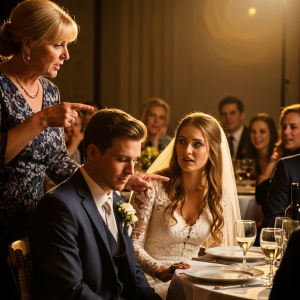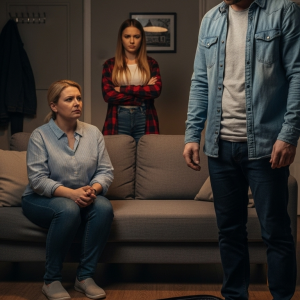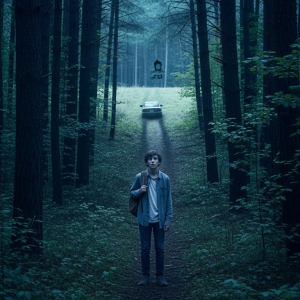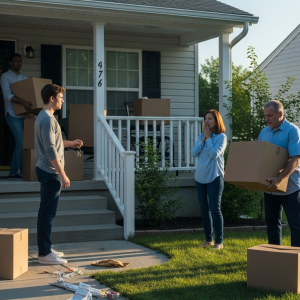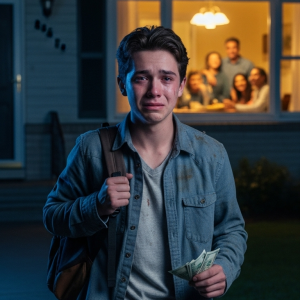I was seventeen when my dad told me I wasn’t built for success. He didn’t yell it in the heat of an argument. He said it calmly, like he was doing me a favor, as if accepting my place in the family would make life easier for everyone.
“You’re the spare,” he said, not even looking up from his newspaper. “Your brother is the heir. You’re just… extra.”
That moment carved something into me. Growing up, I was the background character in someone else’s story. My older brother, Nathan, was the golden child—the star athlete, the honor roll student, the family favorite. He got the bedroom with the lake view and a brand-new car the day he turned sixteen. I got hand-me-downs and lectures for existing too loudly.
I tried to earn my place. I got a job at fifteen, kept my grades solid, even tutored Nathan in math when he started slipping. It didn’t matter. My mom called me lazy for sleeping in after a late shift. My dad said I had no ambition for wanting to go to culinary school. Nathan just smirked, silently enjoying every dig.
Things escalated the summer before my senior year. Nathan, driving drunk after a party, completely totaled his new car. I was the one who found him in the garage, bleeding and crying, begging me not to tell our parents. So I didn’t. I took the blame. I told them I’d borrowed the car without asking, panicked, and ran. I thought, naively, that this act of loyalty might finally earn me some respect.
Instead, they kicked me out.
My dad didn’t even raise his voice. He just pointed to the door. “Pack your things,” he said, his voice flat. “You’ve embarrassed this family enough.”
That night, I slept in a bus shelter. The next morning, I walked back to find a single trash bag on the porch containing my clothes. Tucked inside was a note from my mother: “You’re on your own now. Learn something from this.”
No one checked on me. Not once. My mom told people at church I’d “chosen the streets” because I was rebellious. Two weeks later, Nathan went on vacation to Florida, posting beach selfies like nothing had happened. The silence was the worst part. No birthdays, no Christmas cards. It was like I never existed.
I kept myself alive working double shifts at a convenience store, sleeping on cardboard in the stock room. I got my associate’s degree from a community college, moved three towns away, and slowly built a freelance marketing business from a library’s Wi-Fi connection. For years, I was a ghost, and for the first time in my life, I felt free.
Until last month. I got a text from my mom. Just one line: Is that your face on the billboard off Route 9?
Yes, it was. The local Chamber of Commerce had featured me in a “Young Entrepreneur Spotlight” after I helped several local shops triple their online sales during the pandemic. It wasn’t a huge deal, but to me, it was everything. Proof that I wasn’t a spare.
Two hours later, my dad called. I didn’t answer. Then came the voicemails from Nathan, from relatives I hadn’t spoken to in a decade, all of them suddenly warm, supportive, and curious. I didn’t reply. They hadn’t changed; they had just seen that I now had something they wanted.
The next day, my mom called again. This time, she left a message. “We’re going through a rough patch,” her voice was strained. “Nathan and his wife might lose their place. The baby’s on the way. We were wondering if you still had that spare room you used to mention…”
I laughed out loud. That “spare room” she was talking about? It was in the three-bedroom, two-bath house I had just bought. In cash.
I didn’t respond to her voicemail. Not when my aunt messaged me saying, “It would really mean a lot to the family if you stepped up right now.” Stepped up? Where were they when I was sleeping under a bus shelter?
The following week, I came home to find a familiar silver Honda parked across the street. And there, on my porch, holding a Tupperware container of what I could only assume was guilt-laced banana bread, was my mother.
“Oh my god, you look so good,” she said, her arms reaching for a hug I had no intention of returning. “Mom,” I said quietly, blocking the doorway. “Why are you here?” Her face flickered, and the real reason tumbled out. Nathan and his wife, Alyssa, had been evicted. They needed a place to stay, just for a little while. “Your father thought maybe,” she hesitated, “we could all stay here. Just for a few months.”
I almost laughed. “You kicked me out with a trash bag and a note,” I said slowly, my voice dangerously calm. “And now you want to live in my house to support the son you threw me away for?”
She flinched. “It was complicated back then. We were doing what we thought was right.” “No,” I cut in. “You were doing what was easiest. It didn’t matter if it ruined my life.” For the first time, I saw something close to shame in her eyes. It was quickly replaced by defensiveness. “Well, you’ve clearly done well for yourself. So maybe it wasn’t such a bad thing after all.”
They abandoned me, and now they wanted credit for my success.
“You’re not coming inside,” I said firmly. “And you can tell Dad and Nathan that this house doesn’t have a spare room for any of you.” “You’re being selfish,” she whispered, her last resort. I smiled, a real smile this time. “No, Mom. I’m just done being useful to people who only remember I exist when they need something.” Then I closed the door.
I wasn’t done. I wanted accountability. I drafted a message to my extended family—the cousins, aunts, and uncles who had only ever heard my parents’ version of the story. I told them everything: the car crash, the false confession, the trash bag on the porch, the years of silence. I even attached a screenshot of a text Nathan had sent me years ago, bragging about how easy it was to get rid of me.
I hit send. My phone immediately erupted. Aunt Marie: Is this real? I never knew! Uncle Leo: Your parents said you ran away! Cousin Denise: That text from Nathan is disgusting. I’m so sorry.
Then came the message I never expected. It was from Alyssa, Nathan’s wife.
I’m so sorry. I had no idea. He told me you were unstable and violent, that your grandmother took you in after you assaulted your mom. I feel sick. I left him last night.
She explained that when she confronted Nathan with my message, he had laughed, then gotten angry and tried to delete it from her phone. Seeing the pattern of lies, seven months pregnant, she packed a bag and left.
Three days later, I was leaving a coffee shop when Nathan confronted me in the parking lot. He was a shadow of his former self—unshaven, eyes sunken, reeking of cheap beer.
“You think you’re better than me now?” he sneered. “You want everyone to feel sorry for you with your sob story?” There was so much I wanted to scream at him. Instead, I opened my car door and said just one thing. “You lied. I thrived. And now you have to live with that.”
My grandmother was the only one who never needed proof. A few months after my family’s failed invasion, her health took a turn. She had stage four cancer. My father, a man shrinking inside his own body, was the one who came to tell me. She didn’t want me to know, he muttered, didn’t want to distract me. She was proud of me. That word, proud, hit harder than any insult ever had.
She passed three weeks later, in my home. The one they said I didn’t deserve. I held her hand as her breaths grew shallower. “Promise me,” she whispered, “you’ll plant something new every spring. That’s how you start over.”
After she was gone, I found a small wooden box under her bed. Inside were her journals. She had written down everything. The ignored birthdays, the lies Nathan told, the times my mother called me a mistake when she thought no one was listening. It was all there, documented. At the bottom of the box was a deed transfer for her house, already notarized, making me the sole heir. She hadn’t just given me a home; she had given me the truth.
My parents and Nathan came to the funeral. After the service, my mother approached, her eyes scanning the house, the garden, the community of friends who had become my family. “Is it true?” she asked, her voice tight. “Did she leave it all to you?”
I looked her in the eye and gave her the one thing she always denied me: a simple, undeniable fact. “Yes.”
That night, they left a typed, sterile letter on my doorstep. It was a formal request for “temporary accommodation for healing and transition.” They wanted to live in the house. Her house. The same house they’d barely visited while she was alive.
I sat there for a long time. Then I wrote them back.
Dear Mr. and Mrs. [Last Name],
Thank you for your interest in staying at the residence located at 49 Maplewood Lane. At this time, all rooms are currently occupied by Peace, Silence, Dignity, and the long-overdue scent of lavender. As such, we are unable to accommodate guests who abandoned these values in the past.
May you find shelter in the structures you built with your own choices.
Kindly Despair No More.
I posted the exchange online. For once, I told my own story, with no edits and no shame. It went viral, not because it was dramatic, but because it was real. So many of us, it turns out, are spares.
Today, I walked through my grandmother’s garden and planted something new, just as I promised: a single white rose bush named ‘Rebirth.’ The story doesn’t end with exile or anger. It ends with roots. Because I am not a spare. I am the seed that survived.
The day after I planted the rose bush, it rained. Not a soft drizzle, but one of those cleansing downpours that makes the whole world smell like wet earth and renewal. I stood on the porch with a mug of coffee, watching the raindrops slide off the rose’s leaves. It was only a sapling now, fragile enough that a careless step could snap it in half, but I knew it would survive.
Because I would make sure it did.
That rose became my ritual. Every morning, before emails, before work calls, before I opened the door to anyone or anything, I’d check on it. Water when needed. Clip the tiny dead leaves. Protect it from pests. I realized that in caring for it, I was teaching myself the kind of consistency I had never been shown.
It’s strange how healing works. It’s not one big cathartic moment—it’s dozens of small, quiet ones. A plant that blooms. A laugh with a friend. A night where you sleep without waking from a bad dream.
But peace has a way of drawing out the people who can’t stand to see you have it.
Two months later, a thick white envelope arrived in my mailbox. No return address, but I knew the handwriting on the front: my father’s. I debated throwing it away unopened, but curiosity won.
Inside was a legal notice. My parents were “formally contesting” my grandmother’s will, claiming she had been “unduly influenced” in her final months and “lacked the mental capacity” to make me the sole heir.
The irony nearly made me laugh out loud. This from the people who hadn’t visited her more than twice in her last year.
I called the lawyer who had handled the transfer. “Let them try,” he said, his voice dry with amusement. “Your grandmother kept meticulous records, and I mean meticulous. Every receipt, every doctor’s note, every conversation. If they want to embarrass themselves in court, we can oblige.”
Part of me wanted to fight it out publicly, to let the entire town see them flail. But another part of me—the calmer, colder part—realized something: their lawsuit wasn’t about the house. It was about control. They were trying to pull me back into the chaos, to make me dance to their rhythm again.
I wasn’t going to give them that satisfaction.
When we met in court, I came prepared. Not just with the documents, but with composure. My parents looked older, somehow smaller than I remembered. Nathan wasn’t there; I later learned he’d left town entirely, chasing a job that didn’t exist, running from debts he couldn’t pay.
My mother kept her gaze on the table in front of her. My father, though—he stared at me with something between anger and disbelief, like he still couldn’t reconcile the version of me in front of him with the “spare” he’d dismissed all those years ago.
The judge barely needed twenty minutes to dismiss their case. My grandmother’s records were airtight. Every page was dated, witnessed, notarized. At the end, the judge said something I’ll never forget: “It is clear to this court that the decedent’s wishes were explicit and intentional. This property belongs to the respondent. The petitioners are advised to respect this boundary.”
Respect this boundary. I almost smiled. Boundaries—something they’d never once given me, but now had to obey.
Word got around town quickly after the case was dismissed. Not because I told people, but because they did. Except the story didn’t go the way they’d planned.
Instead of painting themselves as victims, their own bitterness made people remember. Neighbors recalled how my grandmother used to tell them about me planting flowers in her yard when I was ten. Old teachers mentioned how I’d worked late shifts while keeping my grades up. The real history began to seep out, and their narrative cracked.
For the first time in my life, the truth wasn’t just mine—it was shared.
Alyssa reached out again. She’d had her baby, a little girl named Maren. She told me she’d left Nathan for good, filed for child support, and was staying with her sister. “I don’t expect anything from you,” she wrote. “But I thought you should know that not all of us believed the lies forever.”
I wrote back. Told her I wished her well. Told her I hoped Maren would grow up knowing she was wanted. I didn’t offer help, not because I didn’t care, but because I had learned the hard way that my resources were mine to choose where they went.
One evening, I was in the garden when I saw a figure standing at the edge of the fence. It was Nathan.
He looked rough—thinner, pale, a man who had been carrying too much for too long. For a second, I saw the brother I used to want to protect. Then I remembered the text he’d sent me years ago, bragging about getting rid of me.
He didn’t ask to come in. He just said, “I heard about the rose.”
I didn’t answer.
He shifted his weight, looking at the ground. “I… don’t expect you to forgive me. I just… I’m tired, Aaron. Tired of lying, tired of failing. You won.”
That last part made my chest tighten. It wasn’t a compliment. It was an admission. In his world, life was a competition, and I’d somehow come out on top without even playing by their rules.
“I didn’t win,” I said quietly. “I just stopped losing to you.”
He nodded once, like that was all he’d come for, and walked away. I haven’t seen him since.
The seasons changed. The rose bush bloomed. In spring, it was a burst of white against the green; in summer, it was full and lush. I planted more—lavender along the walkway, hydrangeas by the porch, a small patch of basil and rosemary near the kitchen window.
Every new root I pressed into the soil felt like another anchor in a life I had chosen, a life that was mine.
I started hosting community dinners in the backyard. Not big parties—just neighbors, friends, people who cared about showing up for each other. We’d sit under the string lights, passing dishes, sharing stories. I realized that I’d built exactly what I’d wanted all along: not approval, not status, but connection.
One night, a younger neighbor named Chris stayed after everyone left. He’d just turned twenty, and he reminded me painfully of myself at that age—quiet, always on the edge of things.
He asked me, “How do you do it? How do you make a life without the people who are supposed to be there for you?”
I thought about it for a while. “You stop waiting for them to show up,” I said. “And you start showing up for yourself.”
A year passed without a single message from my parents. Sometimes I’d catch sight of them in town, but they’d look away. I didn’t mind. Their absence was no longer a wound—it was just empty space I’d filled with something better.
One morning, as I watered the roses, I noticed something new: a small, unexpected sprout beside the main bush. A cutting, grown on its own, thriving in the same soil.
I took it as a sign.
The next weekend, I dug it up carefully, potted it, and delivered it to the community garden downtown. I left a small tag that read: For anyone who needs a new beginning.
Looking back now, I can see that my story stopped being about revenge a long time ago. Revenge was the spark—it got me moving, made me draw my boundaries. But what kept me going wasn’t the idea of making them regret losing me.
It was making sure I never lost myself again.
The truth is, I was never the “spare.” I was the seed that nobody bothered to water. They left me out in the cold, thinking I’d shrivel up and disappear.
Instead, I grew my own garden. And I’ll keep planting. Every spring. Forever.
